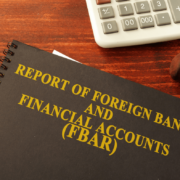Roundup of Individual Tax Changes For 2023
- Learn about Required Minimum Distributions (RMDs).
- Find information regarding the excess accumulation penalty.
- Learn about the benefits of military spouse retirement plan participation.
- Discover information about the clean vehicle credit.
- Learn about the credit for previously owned clean vehicles.
- Find out about early distribution penalty exceptions.
- Learn about credit for energy-efficient home modifications.
- Find information regarding the home solar energy credit.
- Discover the credit for small employer pension plan startup costs.
- Learn about nanny retirement contributions.
- Find information about Qualified Charitable Distributions QCDs).
Serveral recently passed pieces of tax legislation have brought about numerous tax changes for 2023 that may affect you. The legislation includes the Inflation Reduction Act and the Secure 2.0 Act. Fiducial has a condensed summary of those 2023 tax changes. Look over the list below and see if any of the new rules apply to you.

Tax Changes for 2023
Required Minimum Distributions (RMD)
For 2023, the age at which individuals must begin taking distributions from their traditional IRAs and retirement plans is 73, up from 72 in 2022.
Excess Accumulation Penalty
This is the penalty for failing to take an RMD. In the past, this penalty was a draconian 50% of the amount a taxpayer should have withdrawn but didn’t. Beginning in 2023, the penalty is reduced to 25%, and if a taxpayer makes a corrective distribution in a timely manner, the penalty drops to 10%.
Military Spouse Retirement Plan Participation
In the past, because of frequent military moves, a military spouse often failed to qualify to contribute to an employer’s retirement plan. Beginning in 2023, a military spouse may be able to participate in their employer’s plan starting 2 months after their employment begins. They will be immediately 100% vested in all employer contributions.
If the employer agrees to make these changes in their plan, the employer receives a tax credit equal to $200 per military spouse, and 100% of all employer contributions (up to $300) made to the plan on behalf of the military spouse. The result is a maximum tax credit of $500 for the employer. This credit applies for 3 years with respect to each military spouse.
Clean Vehicle Credit
Although the credit can still be as much as $7,500, this credit has significantly changed. For 2023, to qualify for the credit, among other requirements, the vehicle’s final assembly must be in North America. In addition, the manufacturer’s suggested retail price (MSRP) cannot be more than $80,000 for a pickup, van, or SUV and not more than $55,000 for other vehicles. To qualify, a purchaser’s adjusted gross income (AGI) must be $300,000 or less for married taxpayers filing jointly, $225,000 for head of household filers, and $150,000 for others.
Credit For Previously Owned Clean Vehicles
This credit has not been available in prior years. The IRS defines a previously-owned clean vehicle (in other words, a used vehicle) as a formerly owned vehicle of a model year at least two years earlier than the calendar year in which the taxpayer acquires it. The vehicle must have a gross vehicle weight rating of less than 14,000 pounds, be an eligible FCV or plug-in EV with a battery capacity of at least 7-kilowatt hours, and be for use primarily in the United States. Also, it cannot be a vehicle for which a previous credit has been allowed, and it must be acquired from a dealer for a purchase price of $25,000 or less. The available credit equals the lesser of $4,000 or 30% of the vehicle’s price. To qualify, a purchaser’s income is limited – their AGI must be no more than $150,000 for married taxpayers filing jointly, $112,500 for heads of household, and $75,000 for others.
Early Distribution Penalty Exceptions
Current law imposes a 10% additional tax on early (generally before age 59½) distributions from tax-preferred retirement accounts such as traditional IRAs and 401(k) plans unless an exception provided in the law applies. Several new exceptions to the penalty beginning in 2023.
- In case of a distribution to a terminally ill individual.
- For public safety officers at least age 50 or with at least 25 years of service with the employer sponsoring the plan, whichever comes first.
- For corrections officers or forensic security employees that serve as providers of the care, custody, and control of forensic patients who are employees of state and local governments.
- In the case of a federally declared disaster:
- The permanent rules allow a distribution of up to $22,000 from employer retirement plans or IRAs for affected individuals.
- Such distributions are not subject to the early distribution 10% additional tax and are eligible for the gross income from the distribution to be spread over 3 years.
- Distributions can be repaid to a tax-preferred retirement account.
- Additionally, amounts distributed before the disaster to purchase a home can be re-contributed.
- For corrective IRA distributions including the excess contribution and any earnings allocable to that contribution.
- The exception already applies to births and adoptions. Starting in 2023, re-contributions of the distributed amounts are permitted within 3 years.
- For private sector firefighters, extends the age 50 rule (is age 55 for others).
- For domestic abuse survivors for distributions of the lesser of $20,000 or 50% of the retirement account balance.*
* Distributions may be repaid at any time during the 3-year period beginning on the day after the date on which such distribution was received.*
Credit For Energy-Efficient Home Modifications
This provision provides a non-refundable tax credit for certain energy-saving improvements to a taxpayer’s home. This modification exists through 2032.
The previous lifetime credit limit of $500 has been replaced with an annual maximum credit of $1,200. The credit percentage also increased from 10% to 30%. Although not a complete list, the following are annual credit limits that apply to various energy-efficient improvements:
- $600 for credits with respect to residential energy property expenditures, windows, and skylights.
- $250 for any exterior door ($500 total for all exterior doors).
- $300 for residential qualified energy property expenses.
- Notwithstanding these limitations, a $2,000 annual limit applies with respect to amounts paid or incurred for specified heat pumps, heat pump water heaters, and biomass stoves and boilers.
- $150 for a home energy audit.
- The new law adds air-sealing insulation as a creditable expense.
Under the new law, the one making the improvements and claiming the credit need only be a resident of the home and not necessarily the owner.
Home Solar Energy Credit
Beginning in 2023, the credit returns to 30% and extends through 2034, though the credit rate drops to 26% and 22%, respectively, for years 2032 and 2034. The change includes a credit for battery storage technology of at least 3 KW hours.
Credit for Small Employer Retirement Plan Start-up Costs
Under prior law, small businesses (100 or fewer employees) qualify for a nonrefundable credit for administrative and retirement education expenses when adopting a new qualified defined benefit or defined contribution plan.
Beginning in 2023, a new category was added (50 employees or fewer) and the credit percentage increased from 50% to 100%. It applies for 4 years with the credit percentage reduced to 75%, 50%, and 25% in those succeeding years. The maximum credit per year per employee is $1,000.
Qualified Charitable Distributions
Under existing law, a taxpayer may make a Qualified Charitable Distribution (QCD) of up to a total of $100,000 each year by transferring from their traditional IRA to qualified charities of their choice. The QCD offsets their RMD, up to the amount of the RMD.
Beginning in 2023, taxpayers can make a one-time, $50,000 distribution to charities through charitable gift annuities, charitable remainder unitrusts, and charitable remainder annuity trusts.
Want more information related to any of these tax changes for 2023? Call Fiducial at 1-866-FIDUCIAL or make an appointment at one of our office locations to discuss your situation.
Ready to book an appointment now? Click here. Know someone who might need our services? We love referrals!









